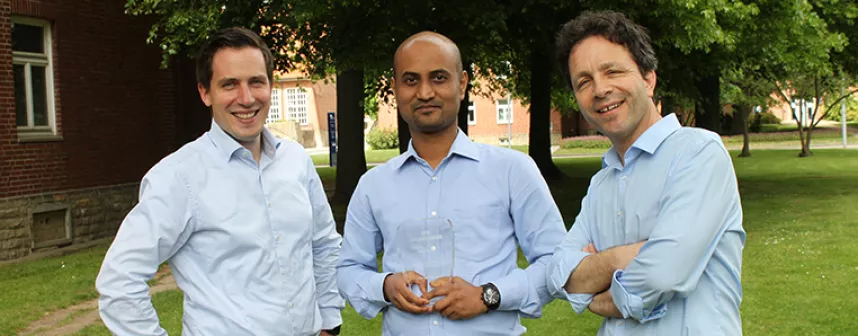Innovation in biotechnology: Sebastian Springer’s group at Jacobs University Bremen wins NanoTemper Explorer Award
June 3, 2019
To answer complex questions from science and medicine, researchers are always keen to use novel technologies. This is why they team up with companies that offer innovative products. To acknowledge such a cooperation, a delegation from NanoTemper, a company in Munich, visited Jacobs University to give its “Explorer Award” to members of the research group of Professor Sebastian Springer.
Springer, Professor of Biochemistry and Cell Biology, and his group investigate so-called MHC proteins. These are tiny little components of the surface of every body cell, even too small for microscopes to see, but crucial for the immune response to viruses and cancer. In their quest to find drugs that bind to these MHC proteins, the researchers realized that they needed to figure out whether the drugs would make the MHC proteins more resistant to heat. “Only drugs that bind tightly to the proteins will make them heat-resistant”, explains Springer. “And binding of the drugs is what we wanted to test.” The researchers came upon the NanoTemper company a few years ago and realized that they had developed a machine, called “Prometheus NT.48”, that would do exactly that: test the heat stability of proteins. With a grant from the German Research Foundation (DFG), they acquired the instrument and found that it dramatically speeded up the experiments, leading to the discovery of several new drug candidates. This was the first time that the Prometheus had been used on a protein of the immune system.
, Professor Springer and his research group investigate the so-called MHC proteins (Source: Jacobs University)With the statement: “We know you are explorers who ambitiously search the unknown”, the NanoTemper team, led by the CEO, Stefan Duhr, acknowledged in a letter the contribution of Springer’s group and especially of the PhD student, Ankur Saikia. „At NanoTemper we have a strong focus on our customers and their success. With this award we want to highlight great science and I am very happy that it also serves as a starting point for future collaborations”, emphasized Duhr.
“At Jacobs University, we have a history of interdisciplinary cooperation”, says Springer. “This is one of our ways to achieve excellence in research.” Consistent with this, the equipment is available to other interested groups to test their own samples, and to start new collaborations that benefit the generation of scientific knowledge.
Further links:
Professor Springer and his team http://springergroup.user.jacobs-university.de/
NanoTemper https://nanotempertech.com/
